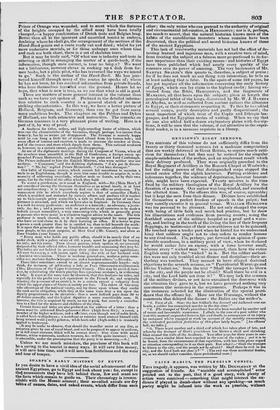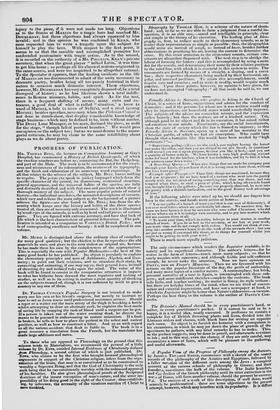CAIUS MARIUS, THE PLEBEIAN CONSUL.
This tragedy, it appears, was written by Mr. DOUBLEDAY at the suggestion of friends. An "amiable and accomplished" actor pointed out to the poet, that if a good story, with plenty of action were contrived —something that might interest the au- dience if played in dumb-show without any speaking—as much poetry might be infused into the work as iossiblei. without injury to the piece, if it were not made too long. Objections as to the fitness Of MARIUS for a tragic hero had reached Mr. DOUBLEDAY. but these objections had always appeared to him invalid; and in this opinion he was confirmed by KEAN, who once requested him to write a tragedy upon the subject for himself to play the hero. With respect to the first point, it seems to us that the amiable and accomplished prompter has confounded pantomimic with tragic action. As to the second, it is recorded on the authority of a Mr. PHILLIPS, KRAN'a private secretary, that when the great player " talked Latin," it was time to get him home ; so perhaps all his classical notions originated in the same source, and were too inspirited to he altogether rational. To the Spectator it appears, that the leading incidents in the life of MARIus are too disconnected to admit of the unity necessary in dramatic poetry, besides being all too purely historical in their nature to occasion much dramatic interest. These objections, however, M r. DoUBLEDAY has very completely disposed of, by a total disregard of history; as he has likewise shown a total indiffe- rence to Roman manners, habits, and spirit. As for the rest, there is a frequent shifting of scenes, many exits and en- trances, a good deal of what is called " situation," a lover (a ward of Marius), a lady (a niece or Sylla's), and a rival (young Menus); besides speeches, necessary when the Plebeian Consul is not done in dumb-show, that display considerable knowledge of stage business—which may be defined to be, form without matter. The Drury Lane Manager, or his man, declined the piece, as unfit for the stage, " though full of poetical beauties." We would pass
• our opinion on the subject too ; but as we must demur to the mana- gerial criticism, be may lay claim to the same infidlibility about plays as we do about poetry.



























 Previous page
Previous page